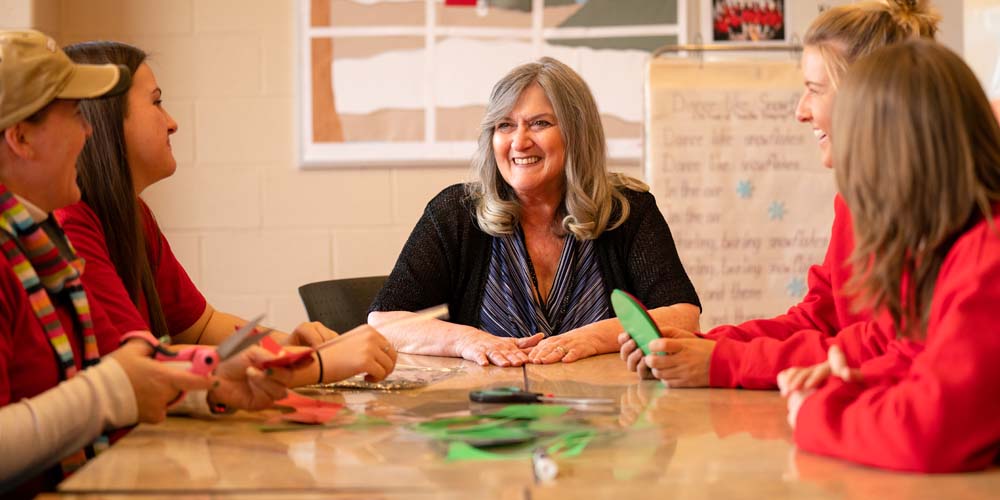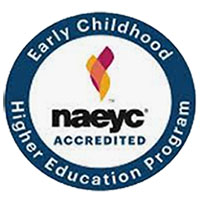Future teachers start here
Love working with young kids? Our program can help you turn that passion into a rewarding career. You’ll learn how young children grow and how to teach them in fun and meaningful ways.
Our courses focus on early childhood development, covering social, emotional, cognitive, physical and language skills —and teach you how to create fun learning experiences.
For a look at all the courses in our program, consult the course list.
Get Started Ask Admissions
Learn by doing
You won’t just study theory, you’ll put it into action.Our program is nationally accredited by the National Association for the Education of Young Children and follows their standards. That means you’ll:
- Learn how to observe and evaluate young children
- Gain hands-on experience in real classrooms
- Plan and lead lessons
- And much more!
Ready to get started?
Lisa Boni of our Early Childhood Studies faculty would be happy to hear from you! Contact her at bonil@macomb.edu.
Work that matters!
But don’t take our word for it, use the tool below to see the positions and salaries that are available with an associate degree from Macomb, as well as with a bachelor’s degree if you decide to continue your education at a four-year college or university.
If you haven’t been recruited by a school before you graduate, our Career Services team can help you with the job search, including polishing up your resume and interview skills.
Additional Information
This degree is aligned with the Michigan Department of Education’s Birth through Kindergarten (BK) standards, making it a great first step toward teacher certification. You can smoothly transfer into bachelor’s degree programs focused on BK or PreK–3rd grade certification.
Our transfer agreements ensure that the classes you take here count at Michigan universities.
Outcome Measure #1: The Number of Program Completers:
| Number of full-time candidates enrolled for the most recent semester available | 26 (24WI) |
| Number of part-time candidates enrolled for the most recent semester4 available | 114 (24WI) |
| Number of program graduates in past academic year i.e. the most recent one-year period for which institutional information is readily available. | 21 (23SS;23FA; 24WI) |
Number and percentage of program completers for the three most recent academic years.
| Academic year | Number of program completers | % of program completers who were attending full-time (at the time of completion) | % of program completers who were attending part-time (at the time of completion) |
|---|---|---|---|
| 2023-24 (23SS: 23FA; 24WI) |
21 | 4.8% | 95.2% |
| 2022-23 | 19 | 15.8% | 84.2% |
| 2021-22 | 19 | 21.1% | 78.9% |
Outcome Measure #2: The Program Completion Rate
The published timeframe for full-time candidates to complete the early childhood program(s).
2 years
The percentage of full-time candidates completing the program within the program's published timeframe.
| Academic year in which a Fall cohort of full-time candidates enrolled in the program | Percentage of those candidates who completed the program within 150% of the published timeframe | Percentage of those candidates who completed the program within (select one measure): ☐ 100% (exactly the published timeframe) ☒ 200% (twice the published timeframe) or ☐ 300% (three times the published timeframe) |
|---|---|---|
| 2020-21 | 14.3% (2 of 14) | 14.3% (2 of 14) |
| 2019-20 | 18.2% (2 of 11) | 27.3% (3 of 11) |
| 2018-19 | 14.3% (1 of 7) | 14.3% (1 of 7) |
Outcome Measure #3: Institutional Selected Data
The fall-to-fall retention rate in the program for each of the three most recently completed academic years
| Academic year | % of Part-Time Candidates Enrolled in the Program (% of Total Enrollment) | Retention Rate among Part-Time Candidates | % of Full-Time Candidates Enrolled in the Program (% of Total Enrollment) | Retention Rate among Full-Time Candidates |
|---|---|---|---|---|
| 2022-23 | 76.9% | 47.7% | 23.1% | 51.6% |
| 2021-22 | 77.0% | 52.1% | 23.0% | 51.7% |
| 2020-21 | 73.8% | 45.9% | 26.2% | 53.8% |
The Associate of Applied Science Degree on Education: Early Childhood Studies Program at Macomb Community is accredited by the Commission on the Accreditation of Early Childhood Higher Education Programs of the National Association for the Education of Young Children (NAEYC), 1401 H. St. NW, Suite 600, Washington DC 20005. The current accreditation term runs from July 2020 through July 2027.

The goal of the Health and Public Services Division is to prepare every student to think critically and practice competently and compassionately in rapidly changing environments. All efforts are designed to build knowledge, enhance practical skills, and promote patient and the population’s safety. Furthermore, the program is designed to foster professional integrity and ultimately improve the health outcomes and protection of patients, families, and communities across the continuum of care and practice. Students must possess certain functional abilities, essential for the delivery of safe, effective clinical care and protection of the public during clinical and internship training activities in the field. Therefore, the faculty has determined that certain technical standards are required for admission to, progression in, and graduation from the Health and Public Services (HPS) programs.
In addition to classroom learning, clinical and internship learning occurs throughout the HPS programs and involves considerations (such as patient and population safety and clinical and internship facility safety) that are not present in classroom accommodations. Applicants or students interested in HPS programs who seek accommodations prior to or immediately after enrolling in the college are highly encouraged to also request an assessment of the types of reasonable accommodations needed for the clinical and or internship components of the program.
An individual must be able to independently, with or without reasonable accommodation, meet the following technical standards of general abilities: (1) observation; (2) communication; (3) motor skills; (4) intellectual, conceptual, and quantitative abilities; (5) essential behavioral and social attributes; and (6) ability to manage stressful situations. Individuals unable to meet these technical standards, with or without reasonable accommodation will not be able to complete the programs and are counseled to pursue alternative careers.
SPECIAL SERVICES STATEMENT: Students may individually discuss the essential functions and technical standards with a college counselor from our Special Services department. In compliance with Section 504 of the Rehabilitation Act of 1973 and the American Disability Act of 1991, academic accommodations may be provided to students who have a documented disability.
For further information, visit Special Services.


